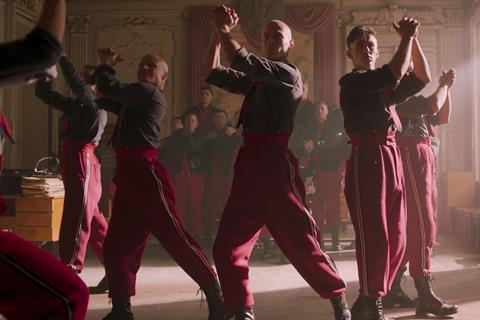
Karlovy Vary International Film Festival has refused to withdraw a state-backed Russian film from its upcoming edition despite an open letter of protest from a group of Ukrainian directors.
The festival in the Czech Republic is set to screen Stalin-era drama Captain Volkonogov Escaped on July 1 as part of its Horizons strand. Directed by Natasha Merlulova and Aleksey Chupov, the film premiered in competition at Venice last year and its production received support from the Ministry of Culture of the Russian Federation.
KVIFF has previously denounced Russia’s invasion of Ukraine and stated that it would not “accept anyone who is in any way associated with Russian state or governmental institutions”.
But plans to screen Captain Volkonogov Escaped sparked an open letter of protest from Ukrainian filmmakers including Maksym Nakonechnyi, whose Butterfly Vision premiered in Un Certain Regard at Cannes; Dmytro Sukholytkyy-Sobchuk, director of Cannes’ Directors’ Fortnight title Pamfir; and Valentyn Vasyanovych, whose Reflection debuted in competition at Venice. All three titles are set to play alongside the Russian film in KVIFF’s Horizons sidebar.
“Screening any film that was financially supported by the Russian Ministry of Culture in the midst of war will whitewash Putin’s regime and make it stronger, giving an opportunity to the Russian propaganda machine to claim it has European support now, when the Russian army is killing thousands of innocent people, destroying cities and its theatres, libraries, schools and memorials, trying to completely kill the Ukrainian culture,” said the letter.
“Presenting any film that was financially supported by the Russian Ministry of Culture at such a large and prestigious international event distracts the international community from war crimes committed against Ukraine.”
In response, KVIFF president Jiri Bartoska, executive director Krystof Mucha and artistic director Karel Och issued a statement today defending its selection.
“Rest assured that we have been carefully observing the situation in your country ever since the beginning of the Russian war aggression and we fully sympathize with all citizens of Ukraine,” they stated, directly addressing the filmmakers.
“We understand your arguments, however, we strictly refuse your interpretation that the screening of this film, which was in the past supported by the Ministry of Culture of the Russian Federation, distracts the international community from the war crimes committed in Ukraine. On the contrary, we believe that by screening the film, we can generate a public discussion which will draw attention to the overlap of the film’s main theme with current events.”
Captain Volkonogov Escaped is set against the backdrop of the Soviet political purges of 1938 and centres on a captain in the secret police who goes on the run to evade prosecution.
“Although the film is set in 1938, quite obvious parallels with the current situation can be found in its story,” the KVIFF organisers added. “We believe that the film provides a fitting description of how the manipulative actions of a despotic leader can influence the mindset of the majority of the society, purposefully create enemies of the regime in the name of ideology and ruthlessly annihilate them, and how such actions ultimately lead to a national tragedy. In this sense, we see the film Captain Volkonogov Escaped as an indirect, but very distinct criticism of the current Russian state regime.”
The letter also highlighted how KVIFF will host the works-in-progress platform of Ukraine’s Odesa Film Festival, which was cancelled this year because of the Russian invasion, as an act of “full support for Ukrainian filmmakers and festival organisers”.
It will also screen documentary Mariupolis 2 by murdered Lithuanian filmmaker Mantas Kvedaravicius, which premiered at Cannes and comprises footage the director shot before he was captured and killed by the Russian army in the Ukrainian city of Mariupol in April.
Transilvania and Filmfest München
Karlovy Vary is the latest festival forced into defend its programming of Russian films, including Captain Volkonogov Escaped, following protests from Ukrainian filmmakers. Last week Transilvania International Film Festival (TIFF) in Romania and Filmfest München in Germany issued similar statements.
“Our common mission is to make sure the Ukrainian spirit is present and powerful in our festival,” said TIFF organisers. “At the same time, as already stated by the international filmmaking community, it is important to not direct hate towards individuals based on their nationality.”
”We strongly condemn the war of aggression that is plunging Ukraine into disaster,” said Filmfest München in a statement. ’That is why we are focusing on Ukrainian cinema and awareness of this war. Young refugee students are accredited, we talk about Ukraine and Ukrainian cinema on the second Friday of the festival [July 1] and have the most important current works on the subject with Butterfly Vision and Mariupol 2. We are doing everything we can to bring the director of Butterfly Vision to the festival, and the German co-producer will talk about Mariupol 2”.
“Filmfest München is also presenting important current Russian films that take a concrete stand against violence and authoritarian systems - by filmmakers who can no longer live in Russia.”






![The Brightest SunScreen[Courtesy HKIFF]](https://d1nslcd7m2225b.cloudfront.net/Pictures/274x183/3/5/0/1448350_thebrightestsunscreencourtesyhkiff_312678.jpg)


















No comments yet